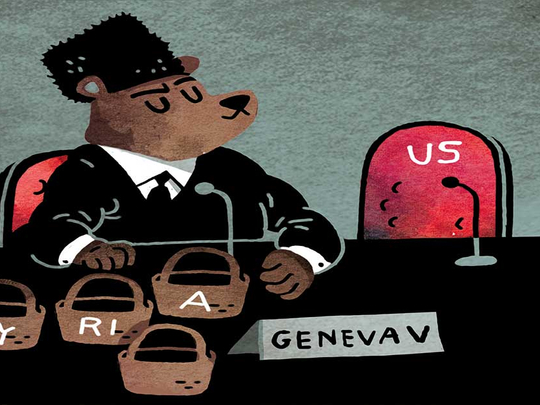
The upcoming round of United Nations-mandated Syria peace talks, better known as Geneva V, will kick off in Switzerland today, only weeks after the last round concluded in early March. Four “baskets” are currently on the table, according to UN Special Envoy Staffan Di Mistura and none speak of decapitation or mention the fate and future of the Syrian president.
The first “basket” deals with creating a transition government that is “credible and non-sectarian,” which the UN diplomat hopes to see within a six-month period, in accordance with UN Security Council Resolution 2254. Syrian and Russian authorities have interpreted the transition to be from war to peace and from one-party rule to a power-sharing formula with the Syrian opposition — but only those signed off by Moscow. The Riyadh-backed High Negotiations Committee (HNC) insists that the first step must be a “Transitional Government Body” (TGB) that takes over completely from Syrian President Bashar Al Assad, but this has strongly been contested by Russian President Vladimir Putin and Iran. They both believe that regime change is now a thing of the past, and are insisting that Al Assad will get to run for two terms when his presidential tenure ends in 2021.
The second “basket” deals with a Russian-authored constitution, presented earlier this year to the Syrian negotiators and shunned both by Damascus and its opponents. The proposed charter grants autonomy to different parts of the country, giving the rebels authority to co-administer territories under their control, mainly in the Syrian north, but it keeps the regime firmly in place in Damascus, although it suggests diluting some of the president’s legislative powers.
Only when the constitution passes it can the two sides move on to the third “basket”, which calls for early parliamentary elections that are “free and democratic”, and ought to be held within a timeframe of 18-months. Theoretically, all Syrians can and should take part in such a process, monitored by the international community. The fourth and last basket was put on the table on March 4 and is a novelty to the political process, calling for a united effort in the “war on terror”. The idea was the brainchild of Russian Deputy Foreign Minister Gennady Gatilov, who attended the last secession in Geneva and flexed his muscles at the negotiating table, making the best out of complete US silence at the talks. Unlike previous sessions that were attended by former United States secretary of state John Kerry, current US Secretary of State Rex Tillerson did not attend Geneva IV and will likely skip Geneva V as well, giving the Russians a carte blanch to dictate their vision of the Syrian endgame, much to the displeasure of traditional backers of the Syrian opposition in Saudi Arabia, Qatar and Turkey.
Moscow hopes that the fourth basket, outlined in very vague terms, will be used to crush all rebel groups that refuse to abide by its vision on Syria. Those who have agreed to work with the Russians have already been invited to a series of technical ceasefire talks in Astana, the capital of Kazakhstan, where they will be meeting again in early April. This applies to powerful groups like the Islamic Army, which controls the town of Douma in the Damascus countryside. Those who are still accusing the Russians of atrocities and genocide will be looped into the “terrorist basket”, accused of being agents, allies or affiliates either of Daesh (the self-proclaimed Islamic State of Iraq and the Levant) or of Jabhat Al Nusra (Jabhat Fatah Al Sham), the Al Qaida branch in Syria.
The Riyadh-backed opposition realises that they are being abandoned by Turkey, whose only objective now is not to topple the regime, but to carve out a safe-zone on its border with Syria, aimed at aborting the creation of a Kurdish state, with the help of Putin. They have already occupied strategic cities like Jarablus, Azaz, and Al Bab and will not be allowed to march further to take on Al Raqqa, whereas Manbij, previously on their hit-list, has been overrun by Kurdish militias and recently handed over to the Syrian Army. The Qataris have been sidelined, almost completely, from the Syrian battlefield, and pro-Saudi fighters have been quarantined in the Damascus countryside by the Russian and Syrian armies, who have cut off their supply of arms, funds, and manpower.
Meanwhile, the Trump White House is showing that it is totally uninterested in the Syrian political process, outsourcing the entire file to the Russians. Since assuming power last January, Trump has been silent on Syria and so is Tillerson. Their three main objectives in the war-torn country are counter-terrorism, empowerment of Kurdish militias and ejecting Iranian ones from Syria.
Left to face their fate are members of the Syrian opposition, who are trying to mend broken fences with the Russians, sacking negotiators who are blacklisted by the Kremlin and saying yes to the “fourth basket” at Geneva V, which if left unchecked, could lead to the termination of their most capable fighters in the Syrian battlefield. They have sluggishly approved Russia’s dictates, adding, however, that counter-terrorism must include reforming the Syrian security services that are still firmly in the hands of the Syrian regime — a rather low ceiling when compared to earlier demands.
Sami Moubayed is a Syrian historian and former Carnegie scholar. He is also author of Under the Black Flag: At the frontier of the New Jihad.









